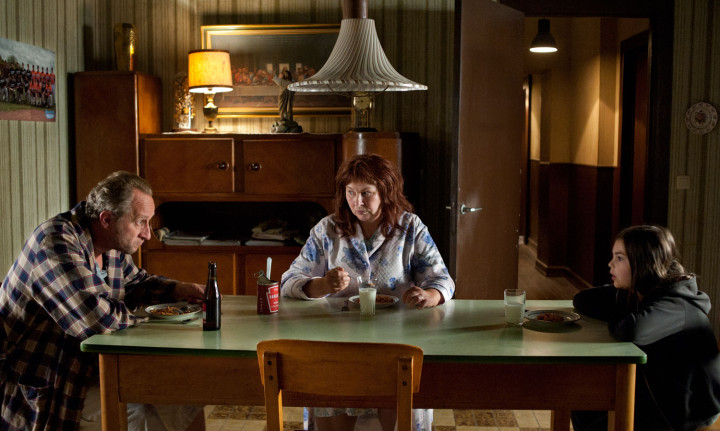The Brand New Testament is a remarkably singular film, a Gnostic satire with a massive heart barely concealed beneath its absurdist facade. Its premise, that God is a largely ineffectual tyrant living in a small Brussels apartment, may well prove too challenging to many viewers of a fundamentalist bent. But those who indulge in a knee-jerk reaction to Testament’s setup would be missing the film’s point if they take offense without adequate consideration of the message it conveys. This one will definitely be filed under the “Not for Everyone” heading, but The Brand New Testament is an adventurous film that takes big chances in the pursuit of a payoff I think it largely attains.
Testament espouses a cosmology not unlike that of the Simonian or Valentinian Gnostics, in which the God of the Old Testament is a demiurge — in literal translation, a “public worker” — who set the events of creation in motion without any motivation beyond his own gratification. Unlike the neo-Platonic and neo-Pythagorean philosophies from which the term was adopted, Gnostics viewed the demiurge as the engineer of all suffering, and the material world which he created as evil in and of itself. In this film — as in the Gnostic conceptions — he’s a bit of a jerk. Where director and co-writer Jaco Van Dormael diverges from these religious traditions is in his comedic tone and visual sensibility, rendering a Gilliam-esque world with surrealist overtones and a touch of Jean-Pierre Jeunet and Monty Python thrown in for good measure. This is a world in which God busies himself with crafting Annoyances instead of Commandments, in which the other line is always faster and the toast always falls face down by divine decree rather than mere misfortune.
The implications of the title say a great deal about its content, as the film recounts the gospel of God’s slightly gothy 10-year-old daughter Ea through her rebellion against her father’s impotent despotism. Ea is following the example of her beloved older brother, euphemistically referred to as simply “JC,” in her quest to gather apostles and write a new testament — or, more specifically, have one written about her by a homeless prophet with questionable spelling abilities. The heretical humor of the script could easily have come across as mean-spirited, but Van Dormael and co-writer Thomas Gunzig strike a delicate balance between sarcasm and sacrilege that amounts to an almost miraculous achievement.
The film lags slightly in the second act as the new apostles are introduced, but pacing in this case is a reasonable sacrifice on the altar of character- and world-building. Ea’s final act before fleeing her father’s house is to simultaneously text everyone in the world their exact time of death (thereby absolving them of their fear and uncertainty), and her apostles are a motley crew of the liberated who will use whatever time they have left to fully engage with life. It’s in the second act that Testament gets to its real purpose, which is not to decry the shortcomings of God but to prompt the audience to question the myriad ways in which we all waste our lives because we know that they will end, just not when.
Significantly, the resolution of the plot hinges on Ea’s mother, a repressed goddess preoccupied with cleaning and baseball until her overbearing husband is out of the picture (apparently, God prefers hockey). This turning point in the narrative provides an absolutely essential statement on the historical relationship between the genders — especially in a religious context — and it’s carried flawlessly. The early Gnostics were a Christian sect predating the Catholic church that granted women equal status to men and allowed them to lead congregations, going so far as to venerate God’s female syzygy, Sophia. While Testament appears to be openly antagonistic toward women (and children) in its early chapters, it comes around like any Gnostic parable should under the story’s circumstances.
All of this talk about religion glosses over the fact that Testament is a profoundly funny and well-executed film. My illustrious predecessor would almost certainly have approved, even if only for the simian value of watching Catherine Deneuve romance a gorilla. Balancing farcical provocation and uplifting humanism, Van Dormael and Gunzig have delivered a film that has earned a place alongside masterpieces such as Life of Brian and The Last Temptation of Christ on my list of the best religious movies ever made. Those who can’t conceive of a joke about religion holding any value will be disgusted from the outset, a loss that will be strictly their own. Those harboring more tolerant sensibilities will find no shortage of appeal in this piece of irreverent Christmas counterprogramming. Not Rated. French with English subtitles.
Opens Friday at Grail Moviehouse.










Before you comment
The comments section is here to provide a platform for civil dialogue on the issues we face together as a local community. Xpress is committed to offering this platform for all voices, but when the tone of the discussion gets nasty or strays off topic, we believe many people choose not to participate. Xpress editors are determined to moderate comments to ensure a constructive interchange is maintained. All comments judged not to be in keeping with the spirit of civil discourse will be removed and repeat violators will be banned. See here for our terms of service. Thank you for being part of this effort to promote respectful discussion.